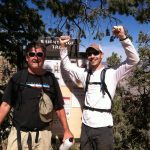How did I get here? Winding career paths
 When our daughter Rebecca was a little girl, she used to say she wanted to be either a waitress at Sonic, or a Doctor. While the career choices for most of us aren’t quite that disparate, they rarely follow a straight line either.
When our daughter Rebecca was a little girl, she used to say she wanted to be either a waitress at Sonic, or a Doctor. While the career choices for most of us aren’t quite that disparate, they rarely follow a straight line either.
Steve Jobs gave the commencement address at Stanford in 2005. In the audience was author Cal Newport, who wrote about it later in his book “So Good they can’t ignore you.”
Per Newport, Jobs offered the following advice: “You’ve got to find what you love. The only way to do great work is to love what you do. If you haven’t found it yet, keep looking and don’t settle.” Jobs received a standing ovation.
Upon examination of Jobs’ early career however, Newport found that he had not followed the advice he gave the Stanford graduates. Newport concluded that “follow your passion” might in fact, be terrible advice.
Back to Steve Jobs for a bit. Jobs started his collegiate education at Reed College in Oregon. Hardly a great student, he was not especially interested in either business or technology. He studied Western history and dance.
He dropped out after his first year, but stayed on campus, more or less living the life of a bum. He finally moved back home to California with his parents, and took a job with Atari. After becoming preoccupied with a nearby commune, he left that job, spent several months wandering through India, and upon his return, started training at the Los Altos Zen Center.
Jobs’ techie friend, Steve Wozniak was hired by a computer time sharing company to design an interface for clients. Wozniak talked them into hiring his friend Steve to assist. Shortly afterwards, Jobs left for a season to spend time at a commune, not telling his boss that he was going. Evidently, Jobs was surprised upon his return to learn that he’d been fired.
This is hardly the picture of the intensely passionate, driven business guru that is Jobs’ legacy. In fact, it’s a picture of a distracted, undisciplined, unmotivated and directionless individual.
Things changed later that year when Jobs noticed that the local techies were buying computer kits and assembling them at home. He and Wozniak decided that Wozniak could build the circuit boards for $25, and they could sell them for $50. They figured they could net a thousand bucks doing this. They viewed this strictly as a short term way to land some cash.
When Jobs talked to the store owner however, he wasn’t interested in the circuit boards, but told them IF they could build an assembled computer, he’d pay $500 each. Jobs and Wozniak jumped at this chance to make a few more bucks. Neither of them saw it as a long term venture.
But, from that was birthed Apple Computer.
Had Steve Jobs followed the advice he gave at Stanford, he would probably have become an instructor at the Zen Center, because as best anyone can tell, that was his passion and love.
Few of us have been as materially successful as Steve Jobs, but like him, most of our career paths have unexpected and even irrational turns. And most of us have become passionate about our career and business, only after being in it.
It’s fair to say, that Steve Jobs had no passion for business and technology until he was in the business of technology.
I have enjoyed some success in business, most of it in the electronic motor drive business. Until in my late twenties, I didn’t even know such a career existed. In the late seventies I found myself unemployed, and grabbing at every job straw I could find.
A young and growing electronic motor drive company in Texas hired me from Alabama, because during the oil boom of that time, they had a difficult time hiring anyone in Texas. It was an ideal training ground for later founding my own company in Georgia. It wouldn’t have happened otherwise.
Seemingly disconnected events like that are more common in successful careers than one may expect. As a Christian, I actually view these events as God’s hand on my life.
Newport laments that what he terms the “passion hypothesis” has permeated career advice and perceptions. The problem is, once you get past the bumper sticker slogans about “follow your dreams” the research indicates that success, job satisfaction and happiness often have little to do with that.
One reason is that we, perhaps inadvertently, assign some career paths higher scores than others. Stanford Professor John Krumboltz notes that when he meets people, they immediately respect him because he is a Stanford professor. They have no idea if he does a good job or not, just the fact that he’s a professor carries great weight.
This mindset works against job satisfaction and happiness. I have a friend, who is a physician. He confided in me years ago that he hated his job. I was taken aback, and questioned him. “There are people that would die to have your job, how can you possibly hate it?”
But Doctor carries great respect doesn’t it?
Most people, unfortunately, spend more time deciding which smart phone to purchase, than they do planning their career. Truthfully, most of us, at the young age we face these decisions, are poorly equipped to make them. Therefore, career dreams and aspirations can be not only illogical, but actually detrimental to success and occupational satisfaction.
There’s great advice in the Bible about this, “whatever you do, work heartily, as for the Lord and not for men.” That applies whether picking apples or performing surgery.
And if the studies are correct, the surgeon isn’t necessarily any more fulfilled in his work than the apple picker.
So, what about your career?
First of all, pay attention. Many of us work in careers that didn’t exist a few years ago. Simply being engaged in the workplace economy, can open your eyes to opportunities you will never see otherwise.
Second, try to ignore what others think about the profession you’ve chosen. Taking a prestigious job you hate is a trap into which many have stumbled. At one time I considered becoming a lawyer, even to the point of taking the entrance exam to law school.
But as I became friends with attorneys and more acquainted with what they actually did, the less attractive it looked to me. Consequently, I abandoned that as a career option.
I talked to a young man once planning to major in journalism. I asked if he enjoyed reading and writing, and his answer was “no, I don’t,” He saw journalist as a prestigious title, and that swayed his decision. I don’t know if he ever completed his degree or not, but I doubt it.
Do your work with passion, whatever it is. Remember the bible quote from earlier? Working hard and well is a virtue. That alone will open up career opportunities you will never see otherwise.
Embrace the trials. Most of us have learned that it was the difficult times that that taught us the most, and shaped our success. A great deal of my early success was my expertise in electronic motor drive technology. I had a bit of a national reputation in this new and emerging field but although I persistently studied it, most of the deep knowledge I gained came from long stressful days and nights spent trying to resolve difficult application issues. This time was often in an industrial plant under extreme pressure.
I can’t say it was fun, but it was beneficial, in fact, sans those times, I wouldn’t have developed the expertise that made me successful later.
Enjoy the ride. I’m sometimes amazed at how much time we humans spend waiting for happiness and satisfaction. We always see it around the corner. “IF only I can land that big job.” “When I get that big raise.” “Once my business takes off, I’ll be so happy.”
And because we are so forward focused, we fail to enjoy the only time over which we exert any control, and that’s the here and now.
Dreaming and planning about the future is great. But, enjoy the now. It’s really the only thing you can be certain of.
And I’ll conclude with this; there undoubtedly are people who seem to have the ability to see the future path of their lives clearly. Most of us however, simply see the path a bit at a time, walking in the light we have. It’s sometimes a little nerve wracking to be sure, but it’s also exciting.
And you can be happy and fulfilled all along the way.
Eddie




